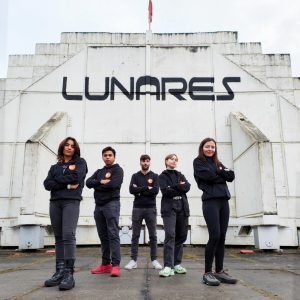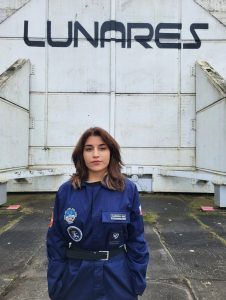Srinagar, March 22: Malik Aasooda, aged 25, refrained from consuming caffeine and sugar for more than two weeks. Given their impact on mood, indulging in them would have posed significant risks prior to assuming the role of an astronaut.
It was in February this year, when what seemed a distant dream, became reality after she secured a sponsorship for being a part of a five-member Analog Mission team – a research method focused on investigating one or several aspects of crewed space missions using earthly real-life situations as an analogue to an off-world scenario.
With her passion for physics discovered at a young age and fuelled by the atmosphere at home and at her school, Aasooda knew her calling.
From representing her primary educational institution ‘Minto Circle School’ in science debates, and then winning the title of ‘Junior Scientist’ at Indian National Science Congress during her school days, she realized science will be taking her to places.
And her realization was correct.
After getting her Master’s degree from the Wroclaw University of Science and Technology, Poland, she opted for a Phd in Physics from the same institution. This set a prelude to what was coming her way.
Aasooda’s research secured her a sponsorship from her university to explore the world of Astrophysics. “It was a significant milestone in my journey,” she asserts.
And soon, she boarded a plane to reach her destination, located on the fringes of Poland. Nestled between the swathes of greenery and forests is LUNARES’ Mobile Research Station, where Aasooda and her team members would eat, sleep, experiment, and repeat the chores like astronauts.
Her mission included several experiments aimed at advancing space exploration even as she investigated the feasibility of 3D printing in space.
3D printing could be a real game changer for manufacturing in space and future missions to the Moon or Mars.
“I also presented a prototype of a tablet holder for a space suit and conducted experiments involving Virtual Reality (VR) in space with my team,” she says. In addition to this, she started working on an anti-radiation mask project, substituting heavy elements like lead with polythene, water and other easily found elements.
Her work could potentially mitigate radiation exposure for astronauts, she explains.
Diving deeper into microgravity studies and psychological aspects of going into space, she pursued the empirical data from the astronauts in orbit to optimize scheduling and task allocation. “The data gathered will be utilized by the International Space Station (ISS) this year, with findings from experiments contributing to the refinement of procedures and equipment,” she proudly says.
Because of her work, she has been invited to the ‘Science Meets Social Science’ conference in Tokyo, Japan. There, she will present the psychological and scientific results, underscoring the importance of interdisciplinary collaboration in space exploration, she says.

A devil of a job
With a strict schedule of starting each day: medical checkups and consuming dehydrated space food for sustenance, she says the mission wasn’t a crystal stair, “but the collective commitment to science among the team made it an exhilarating experience.”
The routine workouts included using space exercise equipment to combat muscle tension and fatigue even as her calorie intake, sleep, and water consumption were closely monitored, she says.
She didn’t see sunlight, or breathe fresh air for over two weeks, but as she sealed her helmet the first time, relying solely on the suit’s oxygen, she was captivated. “I will hold that moment close to my heart, always,” she remarks.
With artificial lighting marking the passage of time, the habitat felt like being in space for real, she recalls. The team recycled water using Grey Water System and cultivated food using aquaponics and hydroponics in their bio lab.
“Scheduled extravehicular activities (EVAs) required us to use heavy spacesuits and internal exoskeletal layers, restricting our movements but ensuring ventilation,” she says. They were trained to communicate externally during EVAs as a rover aided them in navigating paths and collecting samples while monitoring radiation levels.
“Despite the challenges, our mission was filled with moments of discovery and camaraderie as we pushed the boundaries of our understanding of space exploration,” she notes.
They used Virtual Reality and Augmented Reality to make sure their power generation was enough to keep the day going, she says. And were continuously surveilled though cameras by mission control crews, who observed and guided them in their activities.
Her team members, consisting of researchers from different nationalities including Poland, Mexico, Italy, and Czechia expanded the discoveries. “This brought diverse perspectives to the table, enriching our discussions ranging from space architecture to engineering technology and physics,” she explains.
Despite hailing from different countries and cultures, their shared passion for space technologies and the collective goal served as a unifying force, she says. With each passing day, the initial sense of unfamiliarity faded, and was replaced by a common sense of purpose, recalls Aasooda.
The hardest part during the Analog Astronaut Mission was being totally disengaged from the outside world including her family and friends, posing a great emotional challenge, she says. But the psychological support from teams located in the U.S.A, Zurich, Poland, and Italy played a pivotal role in maintaining their well-being, she notes.
And as the day to reintegrate with the outside world came, she experienced a ringing sensation in ears and a minor balance disturbance, “but despite these challenges the feeling of wind on my skin once again was incredibly invigorating,” Aasooda says.
Father’s encouragement
It was her father who motivated her to study Mathematics, which then coupled with her fascination of how physics intertwined with the mathematical concepts and the philosophy of nature, solidifying her commitment to the field, she explains.
Being selected as one of the astronauts was a culmination of years of hard-work, determination and the unwavering support of her family, who have been her greatest source of inspiration throughout her journey, she says.
“My goal is to bridge the gap between Quantum Mechanics and philosophy in a way that makes the mysteries of the universe feel more accessible and meaningful to everyone,” the physics enthusiast says.
“I want to show how the intricate workings of Physics can be seen as the poetic expression of a higher order, something akin to the divine.”
By exploring the philosophical implications of quantum phenomena, she hopes to make the complex mathematical aspects of physics “more understandable and relatable to people from all walks of life.”
“I believe that by blending science with spirituality, we can uncover a deeper appreciation for the beauty and interconnectedness of the cosmos, helping us find our place within it,” says Aasooda who plans to participate in the Quantum Connections summer school in Sweden to delve deeper into the quantum phenomena.
“Joining the Austrian Space Forum, known for its Mars simulated missions, is also on my agenda.”
But Aasooda isn’t stopping here, she aspires to join the European Space Agency (ESA) to contribute to space exploration efforts. “With nearly three more years of research ahead, I’m eager to explore further opportunities,” she says.
Message for home
“As someone who carries Kashmir in my heart and aspires to break new ground, I believe it’s essential for aspiring researchers from our region to broaden their horizons and not limit themselves to conventional domains,” she observes.
“While it’s true that there have been a few Kashmiris recognized by NASA, I see myself as venturing into uncharted territory, not particularly for my own dreams but also for students who look for a sign to follow their dreams,” she declares.
Advising her juniors who have similar dreams, Aasooda says they should develop a versatile skill set and not rely solely on the education system to dictate their path.
“Breaking down barriers and coming forward is essential.” It is by pushing the limits and pursuing the passions with determination that one can make significant strides in research and innovation, “not just for ourselves but for the betterment of our community and beyond,” she asserts.
“Stay connected with mentors and peers who share your aspirations, and never hesitate to seek guidance and support. Together, we can uplift Kashmir and make our mark on the global stage,” she says.
Aasooda says her feat is not just a personal accomplishment but also a “reflection of the potential within each of us to overcome obstacles and reach for the stars.”








